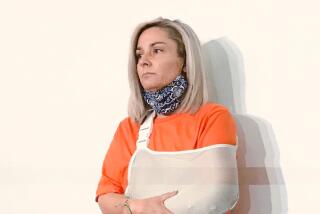Judge Releases Attorney in Baby-Selling Case
- Share via
An Orange County adoption attorney accused of being a go-between in an illegal international baby-bartering scheme was released from federal custody Friday pending her arraignment in two weeks.
Janice June Doezie, 49, of Villa Park was named in a nine-count federal indictment accusing her of helping recruit pregnant Hungarian women in a scheme to sell their babies to well-to-do California couples.
Doezie was stunned by her arrest Thursday at her Orange law office because she had been cooperating with federal authorities in a three-year investigation, said her lawyer, Lloyd Freeberg of Fullerton.
“She participated in a small number of adoptions,” he said, adding that Doezie stopped working with the Hungarian group as soon as she realized its tactics were illegal.
“She has natural sympathy and a desire to help people have children,” Freeberg said. “She is a mother who adopted children on her own, and she wanted to help others. That’s why she went into this business.”
Doezie has a biological son, 31, and two adoptive children, 8 and 9.
U.S. Magistrate Arthur Nakazato on Friday ordered her to secure a $100,000 bond by Oct. 8 and to stay in Southern California. He also told her to avoid any contact with potential witnesses--including some of her clients.
“I do want to cooperate,” she told the judge.
Her arraignment is scheduled Oct. 4.
The indictment, handed down Thursday, accuses Doezie of helping orchestrate two Orange County adoptions in the mid-1990s. It alleges that she persuaded an Orange County couple to write a bogus letter inviting a young Hungarian woman to visit and then falsified paperwork to secure a visa.
Later, a member of Doezie’s office staff helped to smuggle the woman across the Canadian border into Washington state, the indictment alleges.
The indictment also accuses Canadian barrister Heather E. Barnett, 38, of Vancouver of conspiracy.
Freeberg said Doezie charged the parents very little, about $1,500 for handling one of the adoptions.
The practice of bringing pregnant foreign women into the United States to arrange adoptions is widespread, said Ronald L. Stoddart, executive director of Christian Adoption and Family Services in Brea.
The bartering of foreign babies, known as “parachute kids,” is fueled in part by foreign women who are looking for big payoffs, he said.
“They want more than a vacation to the United States,” he said.
American couples typically were charged $12,000 to $20,000 for blond, blue-eyed babies, although one couple paid $80,000, authorities say.
An array of federal and international agencies--the FBI, the Internal Revenue Service,the Border Patrol, the Royal Canadian Mounted Police and the Hungarian national police--are continuing to investigate the alleged Hungarian cash-for-babies ring.
Three years ago, Hungarian-born Marianne Gati, a Canadian citizen living in Irvine, was indicted on charges of brokering about 30 adoption deals. The charges were later dismissed.
It was in Gati-arranged deals that Doezie represented the adoptive parents, Freeberg said.
Gati declined to comment Friday.
The indictment accuses Doezie of one count of conspiracy, three counts of illegally bringing a foreigner into the United States for commercial advantage, two counts of transporting illegal immigrants for commercial advantage, two counts of witness tampering and one count of lying to federal investigators.
If convicted, Doezie faces a maximum of 70 years in prison.
Martha Fekszi Horvath, Hungary’s consul general in Los Angeles, said she was unaware of this week’s indictments. But in Hungary, the case has been big news.
Hungarian prosecutors have charged Endre Czeizel, a geneticist famous there for his television shows on parenting, with referring pregnant women to Gati.
Many Hungarians believe that Czeizel may have acted to help poor mothers who might resort to infanticide, which is on the rise in that country. The Daily Telegraph, an English magazine, quoted Czeizel as saying he was involved with three to six cases with Gati.
“Every country has young persons who want to make money and will do anything,” Fekszi Horvath said.
More to Read
Sign up for Essential California
The most important California stories and recommendations in your inbox every morning.
You may occasionally receive promotional content from the Los Angeles Times.













